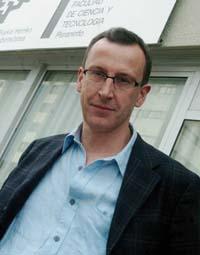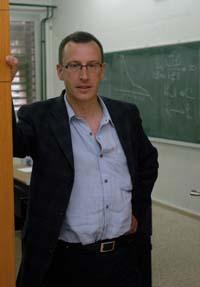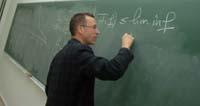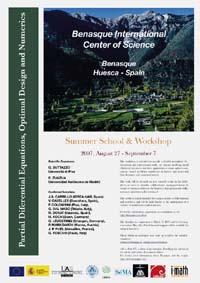Enrike Zuazua: The precision of mathematics in the expression of reality is surprising

Thank you. The truth is that I did not expect it. And in science and technology there are many people doing brilliant things, and in that area mathematics is nothing more than a small field. So I didn't think they would reward mathematics.
That is, to a large extent, it is. Also, keep in mind that currently a mathematician does not work alone. Therefore, when they reward a person, those who work or collaborate with them are also rewarded.
In my case, behind them are the teachers of Leioa, and not only those of Leioa, but also those magnificent teachers I had previously at school. Without them, surely, I would not then choose mathematics as a subject, and now we would not be talking about this.
Yes, that is often heard, but the same can be said in other subjects: language, history, geography... What happens is that mathematics is more difficult than that, and that also influences. However, when I am asked what is the most important thing in the education system? Well I think he is a teacher, because, despite being a small class, having many students, having few resources…, in the end, a brilliant teacher teaches.

Surely not. It can be said that science in general is difficult. However, biology, for example, can also be studied descriptively, even if it is somber. That is impossible in mathematics. Well yes, in geometry, you can say that this image is square or round... But from there it begins to get complicated. Things must be quantified, calculations must be made, and then it becomes difficult.
In mathematics there are two fields, abstraction and computation. And both are somehow difficult for most people. That is evident in the polls. In fact, computing does not have many difficulties. In short, the rules must be followed in a systematic, agile and finished way. It doesn't have to be difficult. But we know that people have problems with it.
Then there is the field of abstraction. And it's curious, but it comes one after another. That is what mathematicians and scientists know, and that is so: before reaching abstraction, many exercises must be done. With many exercises and repetitions, the mechanisms are internalized and become automatic. For example, integration becomes quite simple, but for this first you have to do fifty or a hundred integrals. And that is difficult for people.
Yes, that is the current paradox. We have never lived in such a numerical society and society has never given so much light to mathematics.
And it is to be thanked, of course.

Yes. I studied in Paris, believing it was Laboratoire d'Analyse Numérique --today it is called Jacques-Louis Lions. He was the founder of Jacques-Louis Lions (died six years ago) and I had a unique opportunity to work with him.
The laboratory was created about thirty years ago to study the applications of mathematics. By then, in the world there was a solid current to bring mathematics into practical things.
For this there are several methodologies such as statistics. We all know the use of statistics in surveys, sociology, etc. But often there is a need to use other mathematical tools in other fields, and often the proper methodology is to follow Newton and Galileo.
In Galileo's words, nature is written in the language of mathematics. What does this mean? For if we analyze anything of nature and create a methodology to understand it well, we will create mathematical formulas as much as we want. These formulas are differential equations and partial derivative equations.
We use them to analyze complex problems such as train or car design, aircraft design, power plants, energy problems...
Well, Einstein said, right? It surprises the accuracy of mathematics in the expression of reality. It is really surprising how mathematical models mimic reality.

There are no traps in mathematics, if not logical. Mathematics is a human construction, so from the beginning you can question its value. However, once the basic models and principles are accepted, and following correctly the methodology and rules of the mathematician, there is no room for error.
Yes, mathematics works with abstract instruments and its strength is in that abstraction. Thus, ax=b can be a simple calculation, with a single answer x=b/a, or even a model for the movement of the planets. So, the math trick can be on that simplification; if that simplification is excessive, big mistakes can be made and the result can be wrong. But mathematics is correct. However, mathematics needs appropriate models to give correct answers.
Therefore, in current engineering and technology, mathematics is a tool, but it is not the only one. That is, in the construction of a car mathematical models are used, but laboratory experiments and tests are also carried out. The whole process is not put into the hands of mathematics.
I don't know, it's not easy to say one. He mentioned control before and it is very important because it affects us all. In fact, control is used to control complex processes for our benefit, for example, to maintain an adequate temperature at home or at a large point of sale. Another example may be reducing pollution or noise, or carrying a satellite wherever you want… They are in the process of control.
I have worked hard on that. In this triangle of control theory, differential equations or partial derivatives, and numerical analysis. And I think some things we have done have been interesting. For example, the wave equation is applicable to acoustics, elasticity, etc. and a numerical analysis has been developed that is explained in the control and control of these processes. In addition, it has had a small application in aeronautics, and that is why the jury has mentioned it.
However, in that, in the field of aeronautics, we have been mere advisors. We work with INTA and Airbus engineers. They work with engineering methods, but they know to some extent of mathematics, when the error found is likely to be solved mathematically and when there may be a problem of interest to mathematics. Thus, I have had the opportunity to apply the topics discussed above in a more academic way.
In short, it must be borne in mind that, in mathematics, asking an appropriate question is, in fact, of great value. There we have, for example, Fermat's theorem. He, XVII. In the twentieth century, with a statement without evidence, he left for many other mathematicians a work of 300 years, around which excellent mathematicians have emerged and evolved to answer this question, with the work of Andrew Wiles in 1995.

Yes, totally. Until recently, and now also most of the time, I dedicate myself to theoretical mathematics, although my field is applied mathematics. However, this is completely normal. Sometimes they criticize us because they think we would always have to play in the app, but we are mathematicians. What is the account? Well, if you keep your activity for many years and are willing to talk to other scientists, it is absolutely normal that something multidisciplinary comes out. And that has happened. But for that it takes time, and we now have that time.
Well, young yes, but not so much. Look, we entered the university at the age of 18 and many times we did not leave. I, for example, am 45 years old and that means I have been in college for 27 years. It's many years, so we've been able to do something pretty.
Tell us: The Fields medal is for mathematicians under 40. Therefore, from a mathematical point of view, before the age of 40 we must be able to do important things. Then they have created the Abel prize to reward the complete or unrewarded trajectory in their day. And that's fine.
In any case, there are more and more prizes in the world of science, and I will not say that they are a great incentive, because we do what we do for love, but it is always good that others recognize from time to time our work.

Buletina
Bidali zure helbide elektronikoa eta jaso asteroko buletina zure sarrera-ontzian








